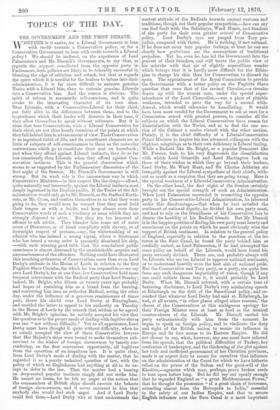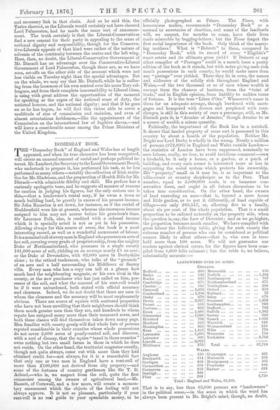TOPICS OF THE DAY.
THE GOVERNMENT AND THE FIRST DEBATE.
WHETHER is it easier, for a Liberal Government to lean with credit towards a Conservative policy, or for a Conservative Government to lean with credit towards a Liberal policy ? We should be inclined, on the experience of Lord Palmerston's and Mr. Disraeli's Governments, to say that, as regards the support conciliated from the opposite party in Parliament, both policies are likely to be tolerably successful in blunting the edge of criticism and attack, but that as regards the spirit which it is needful for the leaders to infuse into their administration, it is far more difficult to animate genuine Tories with a Liberal bias, than to restrain genuine Liberals into a Conservative bias. And the reason is obvious. The spirit of reform is necessarily self-conscious, and is quite awake to the innovating character of its own aims. True Liberals, with a Conservative-Liberal for their chief, are fully alive to. the differences between them, and to the imprudence which their leader will discover in their tone, if they allow themselves to speak without reticence. But it is clear that true Conservatives, with a Liberal Conservative for their chief, are not thus keenly conscious of the points at which they fall behind him in advancement of view. Their Conservatism is an ingrained habit of life, and its constituent elements are as little of subjects of self-consciousness to them as the muscular contractions which go to constitute their seat on horseback ; and when they offend against Liberal instincts, they do so far less consciously than Liberals when they offend against Con- servative instincts. This is the general observation which seems to us suggested by the Parliamentary discussions of the first night of the Session. Mr. Disraeli's Government is still strong. But its weak side is the unconscious way in which Conservative Ministers—in this respect like the clergy—offend, quite naturally and innocently, against the Liberal instincts most deeply ingrained in the English public. If the Tories of the Ad- ministration would only go to Mr. Disraeli, or Sir Stafford North- cote, or Mr. Cross, and confess themselves as to what they were going to do, they would soon be warned that they must hold their tongue as with a bridle, and keep silence even from Conservative words of such a tendency as some which they are strongly disposed to utter. But they are too innocent of offence to ask advice. They blunder into some act of naive scorn of Dissenters, or of frank complicity with slavery, or of downright respect of persons,—say, the whitewashing of an admiral who has hoisted a wrong signal, where a lieutenant who has issued a wrong order is promptly dismissed his ship, —with such winning good faith that the scandalised public conscience is almost disarmed by the unmistakable surprise and unconsciousness of the offenders. Nothing could have illustrated this touching artlessness of Conservatism more than even Lord Derby's attitude in the House of Lords in relation to the first Fugitive Slave Circular, for which he was responsible ;—we say even Lord Derby's, for at one time, few Conservatives held more frequent intercourse with the Radical party than Lord Stanley; indeed, Mr. Bright, who fifteen or twenty years ago probably had hopes of snatching him as a brand from the burning, and converting him into an orthodox Radical, acting the other day, under the influence of a generous reminiscence of times past, threw his shield over Lord Derby at Birmingham, and enabled the latter to appeal to his authority on Tuesday in the House of Lords by the remark that seldom as he agreed with Mr. Bright's opinions, he entirely accepted his view that the question as to the proper mode of dealing with fugitive slaves was one " not without difficulty." Yet to all appearance, Lord Derby must have thought it quite without difficulty, when he so calmly accepted the view of three Conservative lawyers that Her Majesty's ships were bound to make themselves sub- servient to the wishes of foreign slaveowners by tamely sur- rendering, on the first convenient opportunity, all fugitives from the operation of an iniquitous law. It is quite clear, from Lord Derby's mode of dealing with the matter, that he regarded it as a purely technical question of law, with the policy of which no Englishman had anything at all to do ex- cept to defer to the law. That the matter had a bearing on deep-rooted popular instincts simply did not strike him. He meant no harm, for he felt no anger at the notion that the commanders of British ships should execute the behests of foreign slave-owners, and it never occurred to him that anybody else would feel such anger. And if Lord Derby could feel thus,—Lord Derby who at least understands the neutral attitude of the Radicals towards ancient customs and traditions, though not their popular sympathies,—how can any- one find fault with the Salisburys, Ward Hunts, and Sandons of the party for their even greater naivete of Conservative policy. Lord Derby's eyes are purged from Tory pre- judice, compared with theirs. He is nothing, if not rational. If he does not enter into popular feelings, at least he can see clearly how gratuitous are the assumptions of traditional prejudice. Yet he, even he, has led the Government into the gravest of their blunders, and still treats the public view of his mistake with that air of slightly supercilious wonder which betrays that it is hardly more difficult for the Ethio- pian to change his skin than for Conservatism to discard its spots. The appointment of the Royal Commission to provide the Government with a better policy on the Fugitive Slave question than even that of the revised Circular,—a circular drawn up with the utmost care, under the special super- intendence of the Lord Chancellor,—was a piece of pitiable weakness, intended to pave the way for a second with- drawal, which would otherwise be humiliating. It would have been more candid for the Government to ask at once for a Commission armed with general powers, to consider all the subjects on which the Liberal Conservatives have reason for dissatisfaction with the Tories, and so to find the one sec- tion of the Cabinet a modus vivendi with the other section.. Plainly, it is the chief difficulty of a Liberal-Conservative Prime Minister to inspire his less advanced colleagues with the slightest misgivings as to their own deficiency in Liberal feeling. While a Radical like Mr. Bright, or a popular Democrat like Mr. Forster, feels to his very finger-ends the dissatisfaction with which Lord Granville and Lord Hartington look on those of their wishes in which they go beyond their leaders,. Lord Derby, Mr. Ward Hunt, and Sir Charles Adderley sin tranquilly against the Liberal sympathies'of their chiefs, with- out so much as a suspicion that they are going wrong. Here is the special weakness of a Liberal-Conservative Administration.
On the other hand, the first night of the Session certainly brought out the special strength of such an Administration When Lord Palmerston succeeded in reconciling the opposite party to his Conservative-Liberal Administration, he laboured under this disadvantage,—that when he best satisfied the sentiment of national dignity, he divided his own party most, and had to rely on the friendliness of his Conservative foes to disarm the hostility of his Radical friends. But Mr. Disraeli is in the happier position of finding his own party most hearty and unanimous on the points on which he most obviously wins the support of British sentiment. In relation to the general policy of England, especially in relation to the purchase of the in- terest in the Suez Canal, he found the party behind him as cordially united, as Lord Palmerston, if he had attempted the same policy on behalf of the Liberals, would have found his party seriously divided. There are, and probably always will be, Liberals who are too Liberal to approve national sentiment, or to understand heartily even the best side of national pride. But the Conservative and Tory party, as a party, are quite free from any such dangerous impartiality of vision, though if any one could initiate them into it, it would probably be Lord Derby. When Mr. Disraeli referred, with a certain tone of bantering disclaimer, to Lord Derby's very minimising speech at Edinburgh on the drift of the Suez-Canal policy, and re- marked that whatever Lord Derby had said at Edinburgh, he had, at all events, "in other places alleged other reasons," the cheers of the Conservatives at this ambiguous apology for their Foreign Minster were at least as loud as the ironical counter-cheers of the Liberals. Mr. Disraeli carried his party enthusiastically with him from the moment he began to speak on foreign policy, and to vindicate the duty and right of the British nation to secure its influence in. Europe and its free access to its Eastern Empire. He did not choose to say, what, however, any one must have inferred from his speech, that the political difficulties of Turkey, her confession of bankruptcy, and the thickening of the plot against her rude and inefficient government of her Christian provinces, made it an urgent duty to secure for ourselves that influence on the administration of the Canal for which we have hitherto relied on the power of the Sultan and the good-will of the Khedive,—agencies which may, perhaps, prove broken reeds to lean upon before long. But he did say out openly enough that he regarded England as " a great Mediterranean Power,' that he thought the possession " of a great chain of fortresses, extending almost from the Metropolis to India," essential to the safety of our Indian Empire, and that to secure English influence over the Suez Canal is a most important and necessary link in that chain. And as he said this, the Tories cheered, as the Liberals would certainly not have cheered Lord Palmerston, had he made the same sort of announce- ment. The truth certainly is that the Liberal-Conservatives find a new cement for their party in appealing to the sense of national dignity and responsibility, though for the Conserva- tive-Liberals appeals of that kind were rather of the nature of solvents of the continuity between the centre and the left wing. Here, then, no doubt, the Liberal-Conservative Government of Mr. Disraeli has an advantage over the Conservative-Liberal Government of Lord Palmerston, though there are as we have seen, set-offs on the other side Of the account which were not less visible on Tuesday night than the special advantages. But on the whole, we may say that Mr. Disraeli, while he is suffer- ing from the looseness of his own control over his more Tory col- leagues, and from their complete inaccessibility to Liberal ideas, is using with great address the opportunities of the moment for speaking as the organ of the national sense of duty, the national honour, and the national dignity; and that if he goes on as he has begun, he will find this virtue able to cover a multitude of sins of commission and omission, and even of almost ostentatious feebleness,—like the appointment of the Commission on the international law of fugitive slaves,—and will leave a considerable name among the Prime Ministers of the United Kingdom.



































 Previous page
Previous page